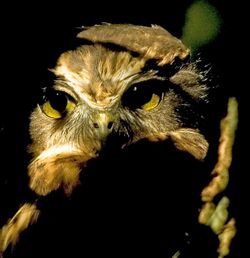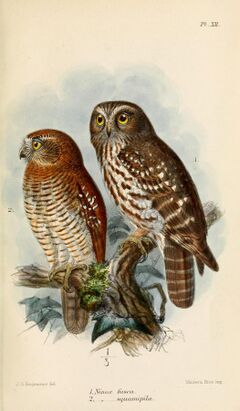Biology:Ninox
| Ninox | |
|---|---|

| |
| Morepork (Ninox novaeseelandiae) | |
| Scientific classification | |
| Domain: | Eukaryota |
| Kingdom: | Animalia |
| Phylum: | Chordata |
| Class: | Aves |
| Order: | Strigiformes |
| Family: | Strigidae |
| Genus: | Ninox Hodgson, 1837 |
| Type species | |
| Ninox nipalensis[1] = Strix lugubris Tickell 1833
| |
Ninox is a genus of true owls comprising 36 species found in Asia and Australasia. Many species are known as hawk-owls or boobooks, but the northern hawk-owl (Surnia ulula) is not a member of this genus.
Taxonomy
The genus was introduced by English naturalist Brian Houghton Hodgson in 1837 with the type species as Ninox nipalensis, a junior synonym of Strix lugubris Tickell 1833. Strix lugubris is now considered a subspecies of the brown boobook (Ninox scutula lugubris).[2][3]
Species
The genus contains 37 species:[4]
- † Laughing owl, Ninox albifacies (extinct)
- Rufous owl, Ninox rufa
- Powerful owl, Ninox strenua
- Barking owl, Ninox connivens
- Sumba boobook, Ninox rudolfi
- Australian boobook, Ninox boobook
- Rote boobook Ninox rotiensis
- Timor boobook Ninox fusca
- Alor boobook, Ninox plesseni
- Tasmanian boobook, Ninox leucopsis
- Morepork, Ninox novaeseelandiae
- Northern boobook, Ninox japonica
- Brown boobook, Ninox scutulata
- Hume's boobook, Ninox obscura
- Chocolate boobook, Ninox randi
- Andaman boobook, Ninox affinis
- Philippine hawk-owl group
- Luzon boobook, Ninox philippensis
- Mindanao boobook, Ninox spilocephala
- Camiguin boobook, Ninox leventisi
- Sulu boobook, Ninox reyi
- Cebu boobook, Ninox rumseyi
- Romblon boobook, Ninox spilonotus
- Mindoro boobook, Ninox mindorensis
- Least boobook, Ninox sumbaensis
- Togian boobook, Ninox burhani
- Ochre-bellied boobook, Ninox ochracea
- Cinnabar boobook, Ninox ios
- Moluccan boobook group
- Halmahera boobook, Ninox hypogramma
- Buru boobook, Ninox hantu
- Seram boobook, Ninox squamipila
- Tanimbar boobook, Ninox forbesi
- Christmas boobook, Ninox natalis
- Manus boobook, Ninox meeki
- Papuan boobook, Ninox theomacha
- Speckled boobook, Ninox punctulata
- New Britain boobook, Ninox odiosa
- New Ireland boobook, Ninox variegata
Genomic studies of the extinct laughing owl of New Zealand indicate that it actually belongs in Ninox rather than the monotypic genus Sceloglaux.[5] The fossil owls "Otus" wintershofensis and "Strix" brevis, both from the Early or Middle Miocene of Wintershof, Germany, are close to this genus; the latter was sometimes explicitly placed in Ninox (Olson 1985), but is now in Intutula. "Strix" edwardsi from the Late Miocene of La Grive St. Alban, France, might also belong into this group.[citation needed]
In human culture
- "NINOX" is an Australian Army project to develop night-vision goggles; it is named after Ninox strenua.
References
- ↑ "Strigidae". The Trust for Avian Systematics. https://www.aviansystematics.org/4th-edition-checklist?viewfamilies=72.
- ↑ Hodgson, Brian Houghton (1837). "Indication of a new genus belonging to the Strigine family, with description of the new species and type". Madras Journal of Literature and Science 5: 23–25. https://www.biodiversitylibrary.org/page/46442146.
- ↑ The Howard & Moore Complete Checklist of the Birds of the World. 1: Non-passerines (4th ed.). Eastbourne, UK: Aves Press. 2013. p. 258. ISBN 978-0-9568611-0-8.
- ↑ Gill, Frank; Donsker, David; Rasmussen, Pamela, eds (January 2021). "Owls". IOC World Bird List Version 11.1. International Ornithologists' Union. https://www.worldbirdnames.org/bow/owls/.
- ↑ Wood, Jamie R.; Mitchell, Kieren J.; Scofield, R. Paul; Pietri, Vanesa L. De; Rawlence, Nicolas J.; Cooper, Alan (2016). "Phylogenetic relationships and terrestrial adaptations of the extinct laughing owl, Sceloglaux albifacies (Aves: Strigidae)" (in en). Zoological Journal of the Linnean Society. doi:10.1111/zoj.12483. ISSN 1096-3642.
- Olson, Storrs L. (1985): IX.C. Strigiformes. In: Farner, D.S.; King, J.R. & Parkes, Kenneth C. (eds.): Avian Biology 8: 129–132. Academic Press, New York.
Further reading
- Gwee, CC.Y.; Christidis, L.; Eaton, J.A.; Norman, J.A.; Trainor, C.R.; Verbelen, P.; Rheindt, F.E. (2017). "Bioacoustic and multi-locus DNA data of Ninox owls support high incidence of extinction and recolonisation on small, low-lying islands across Wallacea". Molecular Phylogenetics and Evolution 109: 246–58. doi:10.1016/j.ympev.2016.12.024. PMID 28017857.
Wikidata ☰ Q913555 entry
 |


